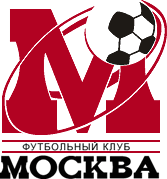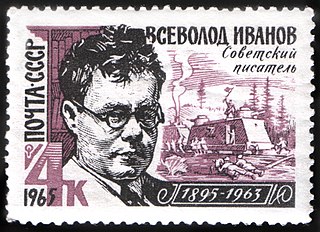This page is based on this
Wikipedia article Text is available under the
CC BY-SA 4.0 license; additional terms may apply.
Images, videos and audio are available under their respective licenses.

Mikhail Mikhaylovich Ippolitov-Ivanov was a Russian composer, conductor and teacher. He music expanded from the late-Romantic era and into the 20th century era.
Alexander Ivanov may refer to:

Valentin Kozmich Ivanov was a Soviet-Russian footballer who played as a winger or as a forward. He was the co-leading scorer at the 1962 World Cup, and the co-1960 European Nations' Cup top scorer.

FC Moscow was a Russian football club based in Moscow.

Vyacheslav Ivanovich Ivanov was a Russian poet and playwright associated with the Russian Symbolist movement. He was also a philosopher, translator, and literary critic.

Vsevolod Vyacheslavovich Ivanov was a notable Soviet writer praised for the colourful adventure tales set in the Asiatic part of Russia during the Civil War.

The Tsar's Bride is an opera in four acts by Nikolai Rimsky-Korsakov, the composer's tenth opera. The libretto, by Ilia Tyumenev, is based on the drama of the same name by Lev Mey. Mey's play was first suggested to the composer as an opera subject in 1868 by Mily Balakirev. However, the opera was not composed until thirty years later, in 1898. The first performance of the opera took place in 1899 at the Moscow theater of the Private Opera of S.I. Mamontov.
The State Academic Symphony Orchestra "Evgeny Svetlanov" is a Russian orchestra based in Moscow. Sometimes known in English as the Russian State Symphony Orchestra, the orchestra gives concerts in Moscow at the Great Hall of the Moscow Conservatory and at the Tchaikovsky Concert Hall.

Ego-Futurism was a Russian literary movement of the 1910s, developed within Russian Futurism by Igor Severyanin and his early followers. Ego-Futurism was born in 1911, when Severyanin published a small brochure titled Prolog (Ego-Futurism). Severyanin decried excessive objectivity of the Cubo-Futurists, advocating a more subjective attitude. Although other Russian Futurists dismissed the Ego-Futurists as puerile and vulgar, Severyanin argued that his advancement of outspoken sensuality, neologisms and ostentatious selfishness qualifies as futurism. The Ego-Futurists significantly influenced the Imaginists of the 1920s.

The Private Opera, also known as:

Chekhovskie Medvedi is a handball club from Chekhov, Moscow Oblast, Russia. Chehovski Medvedi competes in the Russian Handball Super League.
Ivanov, Ivanoff or Ivanow (masculine), or Ivanova is one of the most common surnames in Russia and Bulgaria. The surname is derived from the male given name Ivan and literally means Ivan's.
Sergei Ivanov, former Head of Kremlin Chief of Staff
Vladimir Ivanovich Ageev is a Soviet Chuvash painter. He is a Chuvash people artist, a Merited Artist of Chuvash Republic, a member of the USSR painters Union (1970), and a winner of the Chuvash State Konstantin Ivanov's prize.
Boris Alexandrovich Fogel was a Russian and Soviet painter and art educator who lived and worked in Leningrad, a member of the Leningrad Union of the Soviet Artists, and a professor of painting at the Repin Institute of Arts who played an important role in the formation of the Leningrad School of Painting.









